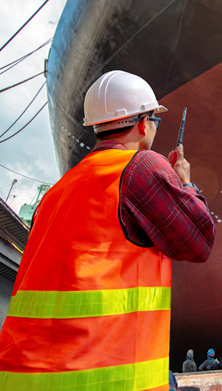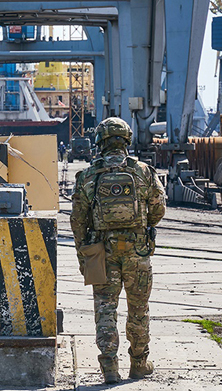Gulf of Guinea sees piracy
activity soar again
In April 2020, the Portugal-flagged container ship Tommi Ritscher became the latest vessel attacked by pirates in the Gulf of Guinea. While at the Cotonou Anchorage, Benin, the 4,785 teu Singapore-owned vessel was boarded by pirates and eight crew were kidnapped. The incident followed the kidnapping of nine crew from the tanker Alpine Penelope in the same area in February 2020.
The Gulf of Guinea accounted for 90% of global kidnappings reported at sea in 2019 with the number of crew taken increasing by more than 50% to 121, according to the International Chamber of Commerce’s International Maritime Bureau (IMB)[1]. “Piracy remains an ongoing issue. We thought we had a handle on it but it has manifested yet again,” says Captain Rahul Khanna, Global Head of Marine Risk Consulting at AGCS. “Hijackings by Somalian pirates may have reduced for now, but incidents have been increasing in West Africa and parts of Asia, where we see a worrying pattern of violent attacks against crew, as well as kidnappings.”
Piracy remains a major risk for shipping. In 2019, there were still 162 incidents of piracy and armed robbery against ships worldwide, down from 201 in 2018. This is despite the recent success in tackling Somali pirates. Somalia reported zero piracy incidents in 2019, a trend that continued through the beginning of 2020. However, Somali pirates continue to possess the capacity to carry out attacks in the Somali basin and wider Indian Ocean.
Following an active 2019, there has been no let-up in piracy in 2020. There were 47 attacks reported to the IMB in the first three months of the year, up from 38 in the same period last year, mostly targeting tankers, as well as container ships and bulk carriers. Again, the Gulf of Guinea accounted for the highest number of attacks (21) although there were also (five) vessels boarded in the Singapore Strait and several incidents of armed robbery in Latin America.

Latin America has also seen a rise in pirate attacks and armed robbery. In April 2020, the US Coast Guard advised vessels transiting the Gulf of Mexico to exercise caution after four attacks in the first two weeks involving crew injuries and theft. A previous attack was reported in November of 2019. In February 2020, armed men boarded the tanker San Ramon anchored off eastern Venezuela, leading to the murder of the captain and the loss of a crew member overboard. The attack marks the return of armed robbery in Venezuela after a near year-long hiatus – there were 36 robberies and attempted robberies between January 2016 and April 2019, many of which involved tankers, according to the Center for International Maritime Security. [2] Given heightened political and economic uncertainty in the world today, piracy is a threat that is likely to remain for the foreseeable future, if not increase, according to Khanna.
“Piracy has proved to be an easy business model, especially in parts of the world where governments are dysfunctional or where there is little rule of law. There is a strong connection between piracy and unstable governments, which provides opportunities for pirates to carry out attacks where the state is not strong enough to properly police its coastal waters.”
“Piracy is typically local in nature but it can have a global geopolitical impact,” says Captain Andrew Kinsey, Senior Marine Risk Consultant at AGCS.
[2] Center For International Maritime Security, Why The Sudden Drop In Armed Robbery Of Ships Off Venezuela, April 1, 2020















